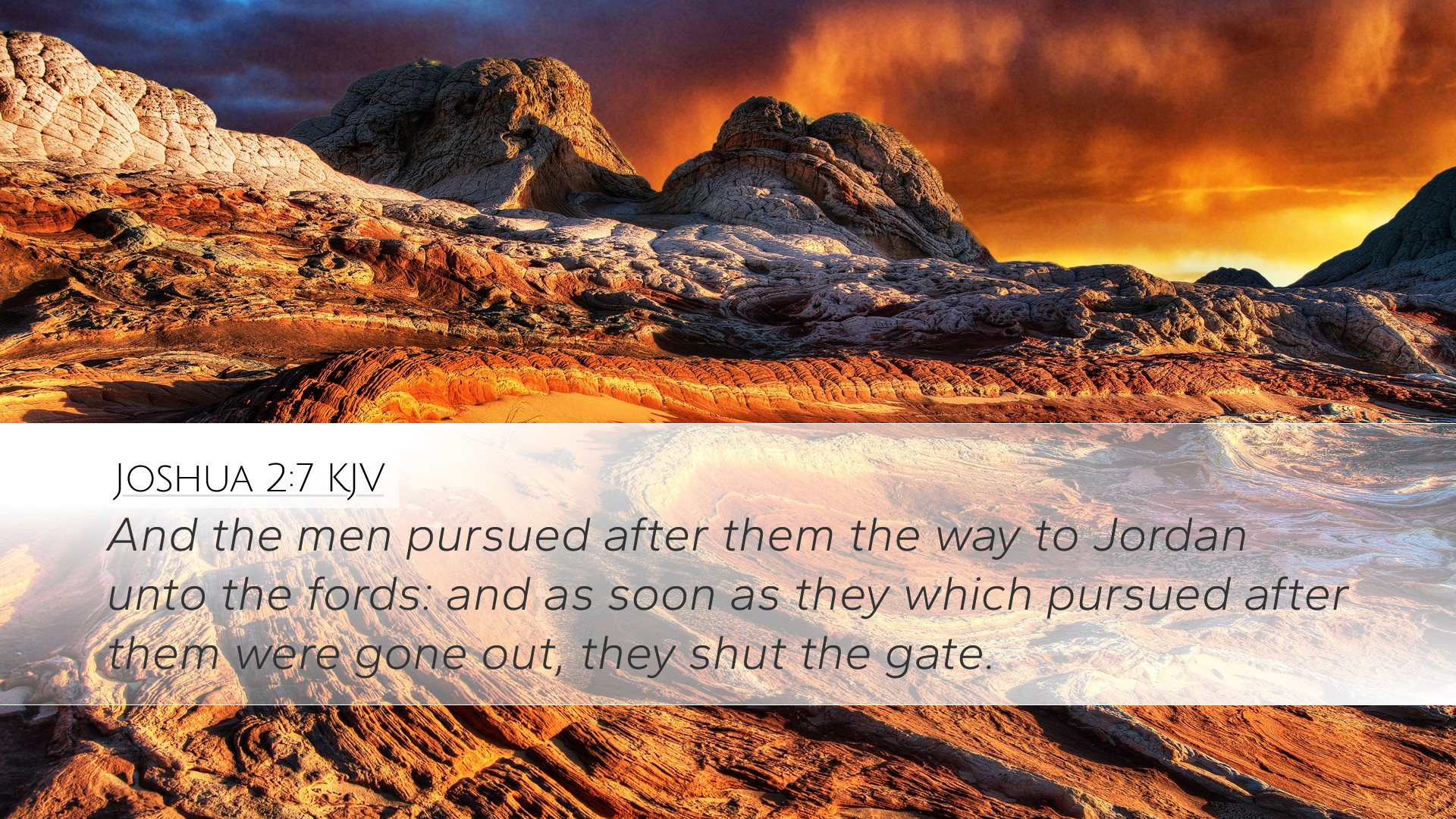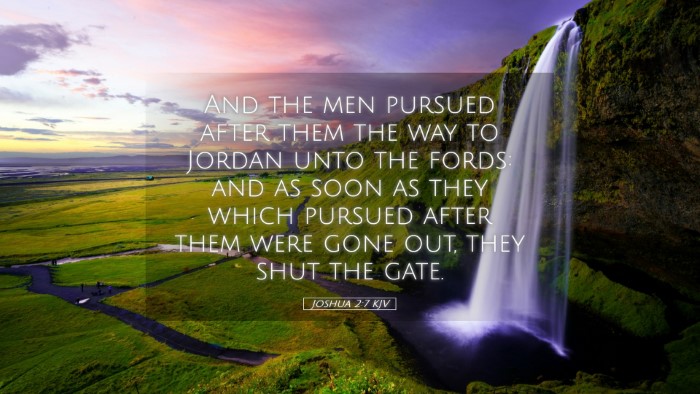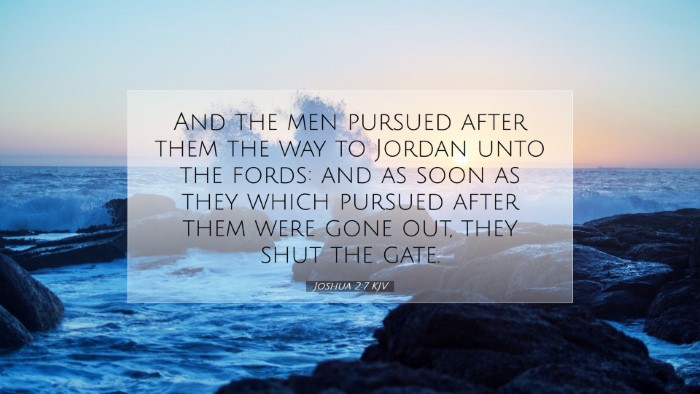Old Testament
Genesis Exodus Leviticus Numbers Deuteronomy Joshua Judges Ruth 1 Samuel 2 Samuel 1 Kings 2 Kings 1 Chronicles 2 Chronicles Ezra Nehemiah Esther Job Psalms Proverbs Ecclesiastes Song of Solomon Isaiah Jeremiah Lamentations Ezekiel Daniel Hosea Joel Amos Obadiah Jonah Micah Nahum Habakkuk Zephaniah Haggai Zechariah MalachiJoshua 2:7
Joshua 2:7 KJV
And the men pursued after them the way to Jordan unto the fords: and as soon as they which pursued after them were gone out, they shut the gate.
Joshua 2:7 Bible Commentary
Commentary on Joshua 2:7
Verse: Joshua 2:7 – "And the men pursued after them the way to Jordan unto the fords; and as soon as they which were pursued were gone out, they shut the gate."
Introduction
This pivotal verse in the narrative of Joshua highlights the providential nature of God’s dealings with His people and the unfolding of the conquest of Canaan. This commentary integrates insights from renowned commentators like Matthew Henry, Albert Barnes, and Adam Clarke to elucidate the depth of meaning in this verse, focusing on its themes of faith, divine orchestration, and the significance of human agency in fulfilling God's purposes.
Contextual Background
Before delving into the verse, it is essential to understand its context within the Book of Joshua. This book serves as a historical account of the Israelites' entrance into the Promised Land. Chapter 2 specifically details the espionage mission undertaken by Joshua, where he sends two spies to scout the land of Jericho.
Detailed Commentary
Verse Analysis
In Joshua 2:7, we observe the immediate response of the king of Jericho to the arrival of the spies. The actions of the king’s men in pursuing the spies reveal their diligence and urgency, reflecting the tension of the moment.
The Pursuit and Timing
Matthew Henry emphasizes the swift reaction of the king’s men to the spies’ presence. Their pursuit "the way to Jordan unto the fords" illustrated both a geographic understanding and a strategic urgency. The "fords" symbolize the crossing points of the Jordan River, which were crucial for the movement of troops and the potential escape of the spies.
Shutting the Gate: A Symbol of Control
Albert Barnes provides insight into the significance of shutting the gate. This act represents a finality and a closing off from escape. The gate's closure emphasizes the king's efforts to regain control over the situation, exerting authority and desperation in the face of a potential threat from the Israelites. Such imagery of gates appears frequently throughout biblical literature, often symbolizing barriers and the decisions made in moments of crisis.
Divine Providence
Adam Clarke points out that despite the king's best efforts, the sovereignty of God prevails. The Lord’s hand was upon the Israelites, guiding them even in the midst of hostile pursuits. Clarke urges readers to recognize how the events in this passage act as a foreshadowing of God's later deliverance of His people. The narrative thus portrays not just a historical occurrence but invites reflection on divine sovereignty in human affairs.
Thematic Insights
From this analysis, several key themes arise that deepen our understanding:
- Faith and Courage: The spies’ decisive actions reflect their faith and courage derived from Moses’ promises and God's assurances.
- Human Agency: The pursuit of the spies underscores human responses to divine plans. The king's men embody human opposition to God's unfolding purposes.
- Inheritance of the Promised Land: The urgency felt by both parties indicates the critical nature of this moment in the overarching narrative of the Israelites’ journey towards the Promised Land.
- Symbolism of Gates: Gates often symbolize access and barriers—communicating themes of protection versus vulnerability within the spiritual and physical realms.
Practical Applications
The lessons derived from Joshua 2:7 are manifold and resonate deeply with the contemporary believer:
- Vigilance in Spiritual Warfare: Just as the king of Jericho was vigilant, believers are called to remain alert to the schemes of the adversary in their lives.
- Trust in God’s Sovereignty: The closing of the gate reminds us that God can intervene in seemingly hopeless situations. His providential care is ever-present.
- Courage in Mission: The spies exemplify the courage required in fulfilling God's mission, encouraging believers to act boldly in faith.
- Intercession for the Unsaved: The narrative invites us to pray and work for those who are resistant to the Gospel, represented by the king’s men.
Conclusion
Joshua 2:7 encapsulates significant theological truths about God’s interaction with His covenant people amid human opposition. By drawing from public domain commentaries, one can see that this single verse carries profound lessons about vigilance, divine providence, and the spiritual warfare believers navigate today. Pastors, students, and theologians alike can glean wisdom from this verse as it speaks to the ongoing narrative of faith, courage, and the ultimate fulfillment of God's promises.


